Track Your Order | Free Delivery > ₹ 499
Organic Sprouted Ragi Flour 500g | Nachani Satva | Cold Milled | Calcium Rich Food
₹150.00 – ₹300.00
📊 Nutrient Highlight
🔹 Protein: 🥣 9g per 100g (18% of daily requirement) 💪🏼 🔹 Fiber: 🍃 11g per 100g (44% of daily requirement) 🩺 🔹 Calcium: 🦴 350mg per 100g (35% of daily requirement) 🦷 🔹 Iron: 🔥 4mg per 100g (22% of daily requirement) 🩸 🔹 Vitamin D: ☀️ 0.25mcg per 100g (2.5% of daily requirement) 🌿
☯️ Better Nutrient Absorption – Sprouting enhances mineral bioavailability, making calcium and iron easier to absorb.
☯️ Improved Digestion – Reduced anti-nutrients lead to easier digestion and better gut health.
☯️ Balanced Energy Levels – Low glycemic index supports steady blood sugar and sustained energy.
Click below to know more:
Benefits of Sprouted Ragi Flour – A Nutrient-Dense Flour
- Premium Quality
- Secure Payments
- Worldwide Shipping
Organic Sprouted Ragi Flour – Nutritionally Superior & Beneficial
Organic Sprouted Ragi Flour is nutritionally superior and offers a whole range of health benefits. The sprouted ragi benefits are numerous, making it a highly sought-after product for health-conscious individuals. Incorporating sprouted ragi powder into your diet can enhance your overall wellness.
Ragi (finger millet) is one of the oldest cultivated millet in India. It is rich in antioxidants, vitamins, and minerals. It exhibits anti-diabetic, anti-microbial, and anti-ulcerative properties. Traditionally in South India, ragi flour is used in diabetic management, as baby food, and as a calcium supplement. The sprouted ragi powder is prepared from scratch at some households even today.
At Dhatu, organic sprouted ragi flour is sprouted and dried at low temperatures to retain maximum nutrition. These grains are then cold-milled (i.e., flour is not heated while milling) & are not exposed to scorching heat. Low temperature means all the nutrients are retained in the flour. Our sprouted ragi powder is nutritionally superior and is made in small batches. Our sprouted ragi flour is also sometimes referred to as simply ragi powder or also known as ragi atta or sprouted ragi atta. In North India, sometimes it is referred to as Ragi Atta as well. Our ragi powder is suitable for babies and older individuals alike. Sprouted Ragi Flour is also known as Nachani Satva.
Sprouted Ragi Flour Benefits
The sprouting process increases the nutritional content of the grains. The grains become alive, and the nutrition is readily bio-available. Some of the primary sprouted ragi flour benefits include:
- It is easily digestible, and greater nutrition assimilation in the body happens due to bioavailability.
- Sprouted ragi flour is rich in Calcium, Iron, and health-promoting polyphenols.
- It is a great source of fiber and contains both soluble and insoluble fibers. Insoluble fibers are known as “Prebiotics” as they promote healthy biomes in the gut.
- The sprouting process also reduces the anti-nutrients (like phytic acid) which essentially bind to the minerals and does not allow the body to digest them.
- It is naturally gluten-free.
- It is greatly suited for diabetic diet plans.
- It has an alkalizing effect on the body and is a non-acid-forming food.
Several scientific studies confirm the good effects of dietary fiber (both soluble and insoluble) present in finger millet. They offer several health benefits such as anti-diabetic, antioxidant, hypocholesterolemic, antimicrobial effects, and protection from diet-related chronic diseases to regular consumers.
The insoluble fiber present in finger millet adds bulk to stools and regularizes bowel movements, greatly supporting the prevention of colon cancer.
The other significant nutrient present in finger millet is polyphenols. These are a complex mixture of benzoic acid and cinnamic acid derivatives and exhibit enzyme inhibitory and anti-cataractogenic activities.
People who are sensitive to gluten can include ragi in their diet plan. For further detailed benefits one can read our post here.
Importance of Calcium in Diet
Calcium is important for the growth of infants through to early young age to build a strong bone structure. As one ages, osteoporosis problems pose a serious threat to one’s life. So it becomes critical to include natural plant calcium sources in the diet regularly. For people who are in the low-income bracket, finger millet offers an excellent opportunity to include Calcium in their diet.
The fact that the bioavailability of calcium from ragi is high can help children, the elderly, and women. Further, the sprouting and fermentation of ragi increase the bioavailability of calcium! Many government-level projects in poor and rural areas of India and other developing nations use ragi in their food programs to tackle anemia and calcium deficiency among the people.
How to Use Sprouted Ragi Flour
- Make porridge by adding mild spices or just salt. It is great for babies. It’s high in calcium and helps in building the bone at a young age.
- Make dosa/pancakes.
- Mix with your baking dough/flour.
- Simply make Ganji/Kanji and drink it on a hot day, or make a tasty porridge for babies and adults! Ragi is cooling and anti-inflammatory.
- Make region-specific delicacies such as Ragi Mudde (also known as Ragi Balls) or Ragi Rotti.
Apart from health benefits, growing and consuming finger millets is also earth-friendly. Finger millet crops are drought and pest-resistant. This means they do not require large amounts of water to grow, nor do they need the spraying of pesticides!
Sprouted Ragi flour Vs Ragi Flour
Here are five key differences between sprouted ragi flour and regular ragi flour:
| Aspect | Sprouted Ragi Flour | Regular Ragi Flour |
|---|---|---|
| Nutritional Value | Higher bioavailability of vitamins and minerals (Vitamin C, B vitamins, iron, calcium, magnesium) | Retains original nutrients but has lower bioavailability |
| Digestibility | Easier to digest due to reduced anti-nutrients and enzyme activity | Harder to digest due to the presence of phytic acid and complex starches |
| Glycemic Index (GI) | Lower GI, better for blood sugar control | Higher GI due to unaltered complex carbohydrates |
| Taste & Texture | Lighter, nuttier, and slightly sweeter | Denser, more earthy, and grainy |
| Processing | Requires sprouting, drying, and grinding | Directly ground from raw grains |
Why Sprouted Ragi Flour ?
✅ Higher Nutrient Absorption – Sprouting reduces antinutrients (like phytic acid), making calcium, iron, and other minerals more bioavailable.
✅ Easier Digestion – The sprouting process breaks down complex starches and proteins, making it gentler on the stomach.
✅ Rich in Essential Amino Acids – Contains lysine, methionine, and tryptophan, which are crucial for muscle repair and overall health.
✅ Low Glycemic Index – Helps regulate blood sugar levels, making it a great choice for diabetics and weight management.
✅ Boosts Bone Health – Packed with calcium and vitamin D, promoting stronger bones and preventing osteoporosis.
Explore more sprouted flours, which offer similar benefits:
Discover more from Dhatu
Subscribe to get the latest posts sent to your email.
| Weight | 0.5 kg |
|---|---|
| Weight | 500g, 1kg |
| Packs | Pack of 1, Pack of 2 |
2 reviews for Organic Sprouted Ragi Flour 500g | Nachani Satva | Cold Milled | Calcium Rich Food
Only logged in customers who have purchased this product may leave a review.

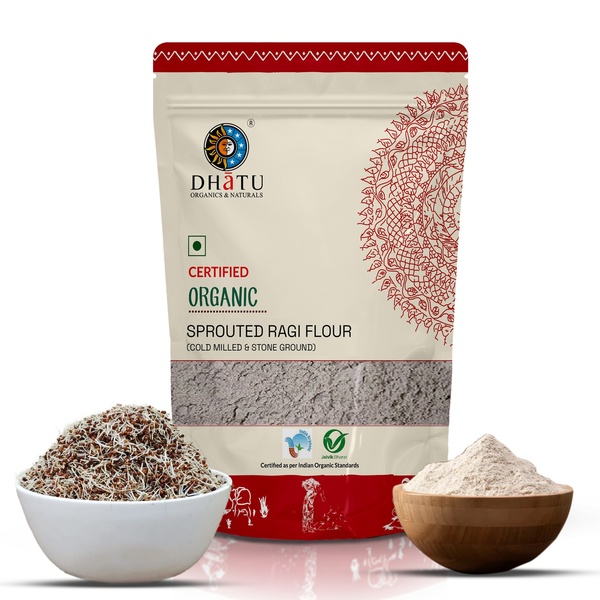
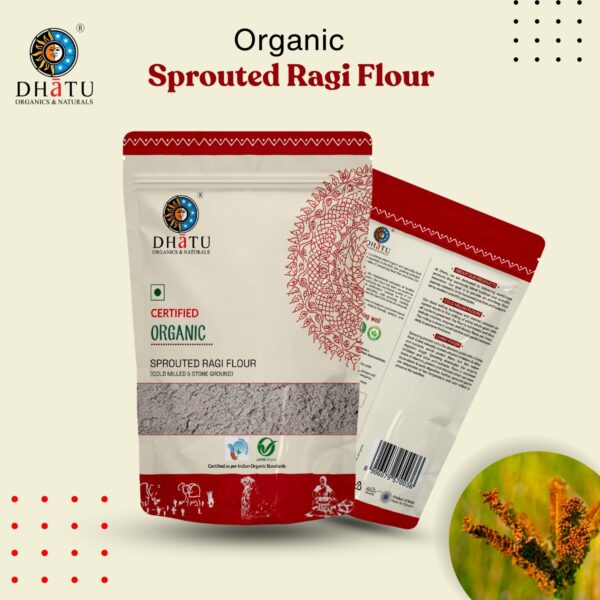
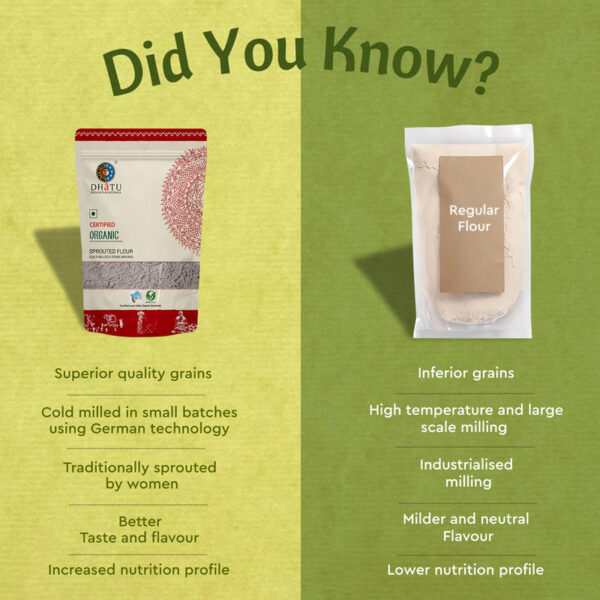
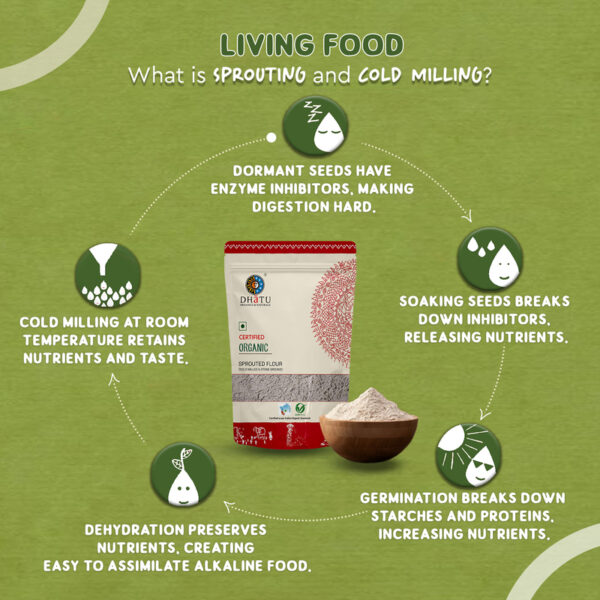
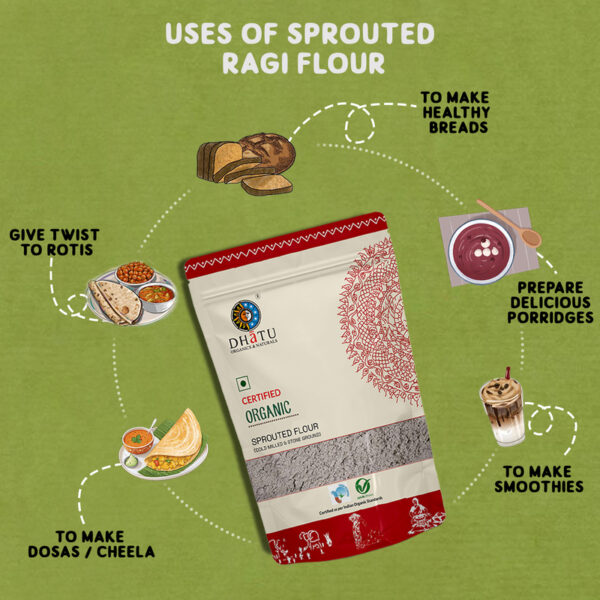
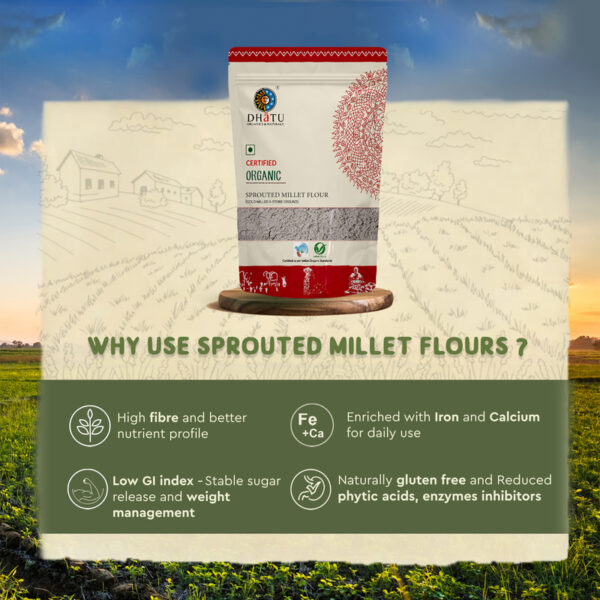

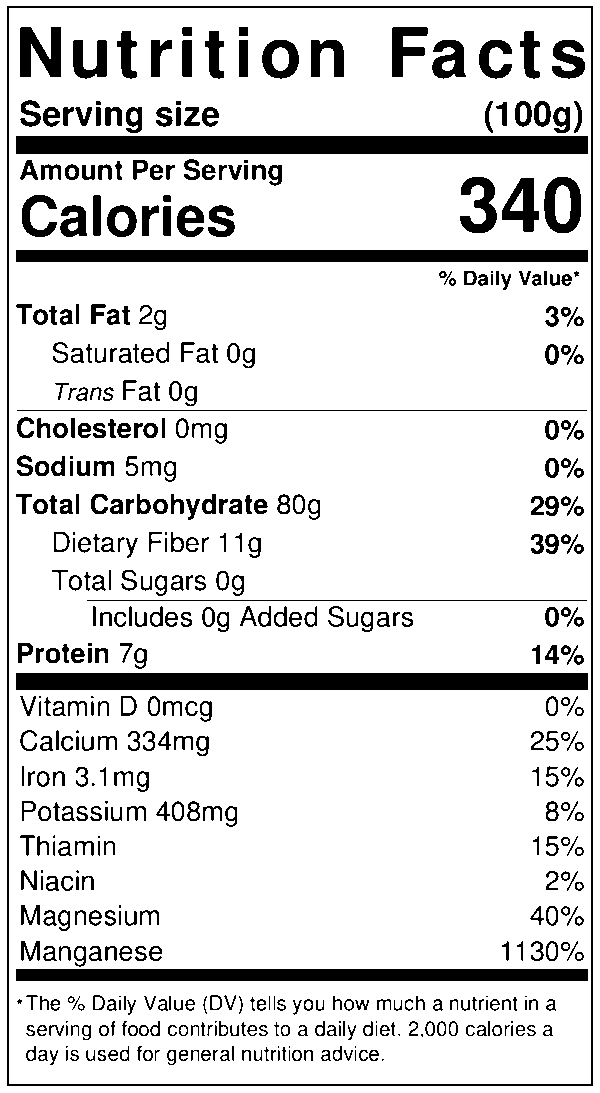
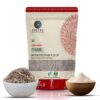
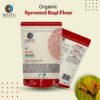

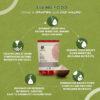




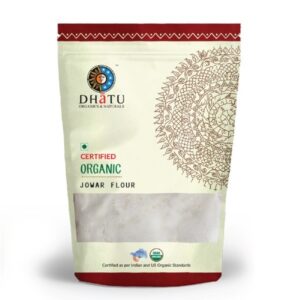
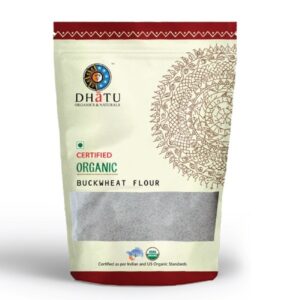
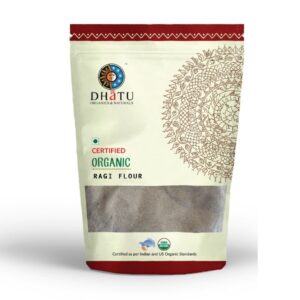
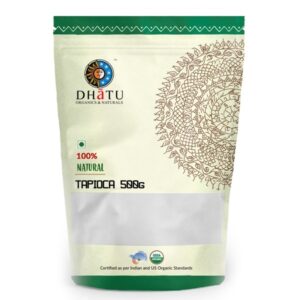
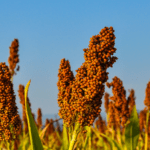
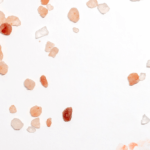

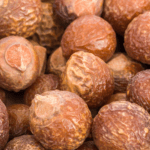
TNC Govindarajan (verified owner) –
It is quite good.
anand krishnamoorthy (verified owner) –